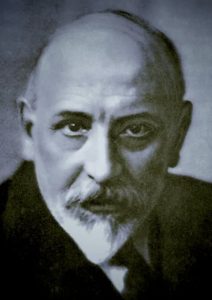Article index
The voice as a vital flow mirror.
"Life is a continuous flow that we try to stop, to fix in stable and determined forms, inside and outside us, because we are already fixed forms, forms that move in the midst of other properties"
Pirandello
 So writes Pirandello in his essay "Humor". Is the voice mirror of that flow? Within us this flow continues, "under the banks, beyond the limits we impose", beyond the rules and daily duties.
So writes Pirandello in his essay "Humor". Is the voice mirror of that flow? Within us this flow continues, "under the banks, beyond the limits we impose", beyond the rules and daily duties.
It is the true himself supported on the company's fence. In certain moments the forms are unable to retain their lymph, which overflows and floods reality: the flow comes out of the body and generates a truth that we call human voice.
What blocks the voice flow?
The forms that we give to our social behaviors "can follow the flow of life, until so much that, by stiffening as they are, the movement, already gradually slowed down, does not cease".
When something blocks, one of the effects is a sort of "disease" of the voice, as if the channel was obstructed. The disease is not the problem, but the result.
We receive many small signs that, albeit outside normal, that is, against the rule, we do not listen.
When you accept irregularities without condition, it becomes the new rule. The body must therefore invent a new irregularity, a new signal, to indicate the questioning of a part of oneself, to achieve the necessary change.
What do we pretend not to see? What "blocks" the vocal-vital flow?
The banks have already been overcome. What have we become? The voice is always a mirror of our intimacy. Behind the clothes of the newspaper we hide our chains.
We learn to dialogue with ourselves.
We therefore allow ourselves to open the ego in the world and to welcome it in us, it will be a channel for that voice that can free itself. We accept a dialogue between ourselves and the world, since the world is around us anyway.
Our path moves on insecure roads, uncertain because human, but if we are not transparent towards our identity, how can we walk convinced of our goals?
It is true, sure we will never be, but at least we can be aware that we have limited the deceptions of our destiny, those that we build with our hands.
Our voice can be herself, just as we can be, inside the world's room.
The voice as a place of our history.
 Personal history is in its own voice, clinging to the culture of the place where you grew up. "Place", first in its local and national sense, then at the time one, that is, in the wider meaning of the era in which you were born, with its dynamics and social habits.
Personal history is in its own voice, clinging to the culture of the place where you grew up. "Place", first in its local and national sense, then at the time one, that is, in the wider meaning of the era in which you were born, with its dynamics and social habits.
The voice itself is first of all a space of stories, meetings, past, present and future. From his analysis perhaps it is possible to discover a very intimate part of us.
The rumor is discovered for the mere fact of being there. When it is born, it can only discover itself. The voice is always itself. It cannot hide anything, it can only transmit clues, if you learn to listen.
I know I don't know: knowing how to listen.
Vocality is a place of landscapes, reflections and shadows, it is a city of encounters, of constant discoveries.
The Socratic "I know I don't know" is essential to continue any investigation, which can never end, as listening can never be said to be finished in a world always in the making. As in the making are the voice of nature and the human voice, inserted, to mention Bauman, in a changing and fluid world.
Knowing how to listen is the only way to maintain, as consistently possible, the communication between what we feel and what we can express. If that bridge is alive, then real communication will also remain alive.
Bibliographic notes: L. Pirandello, Humor, Milan, Feltrinelli, Part II, Chapter 5
Read also Italian songs to trust themselves








